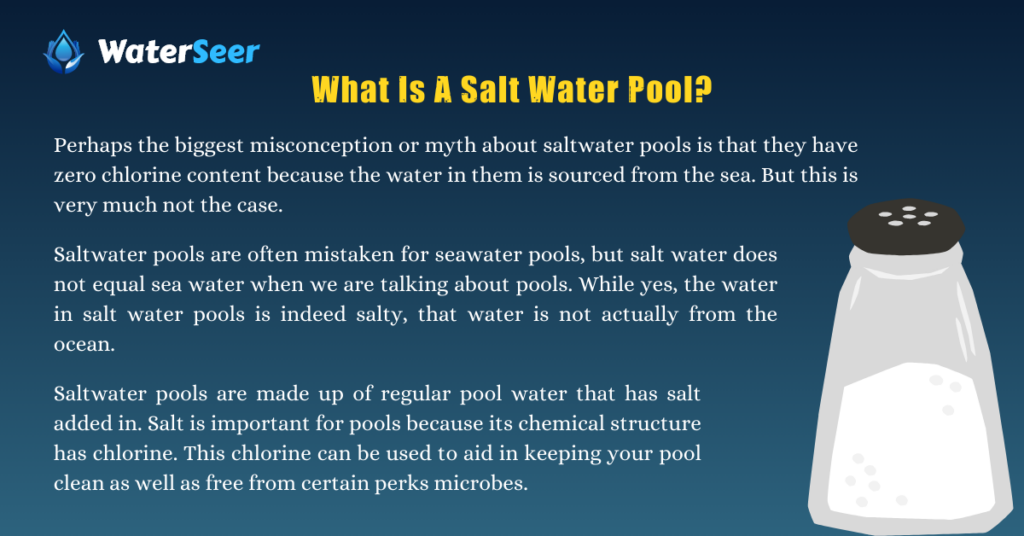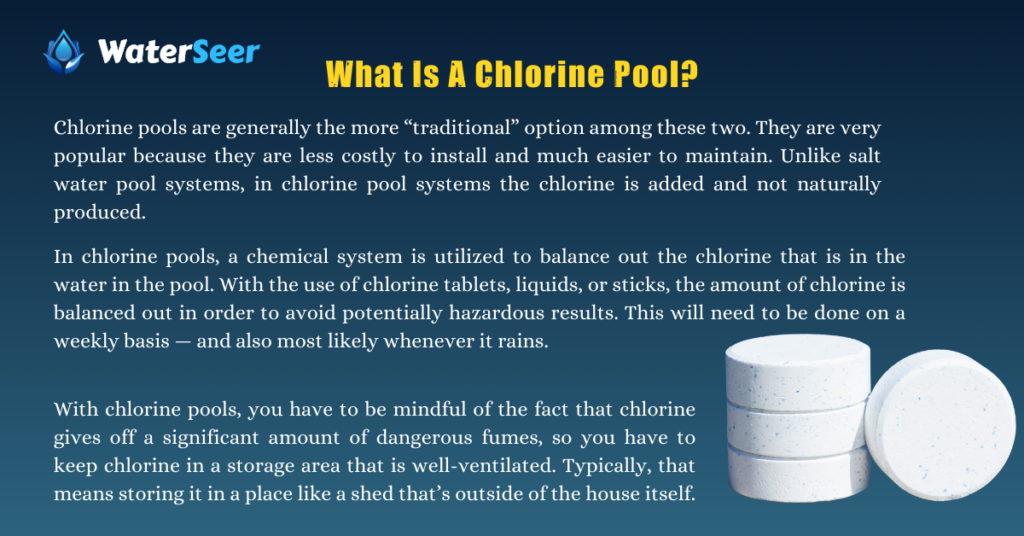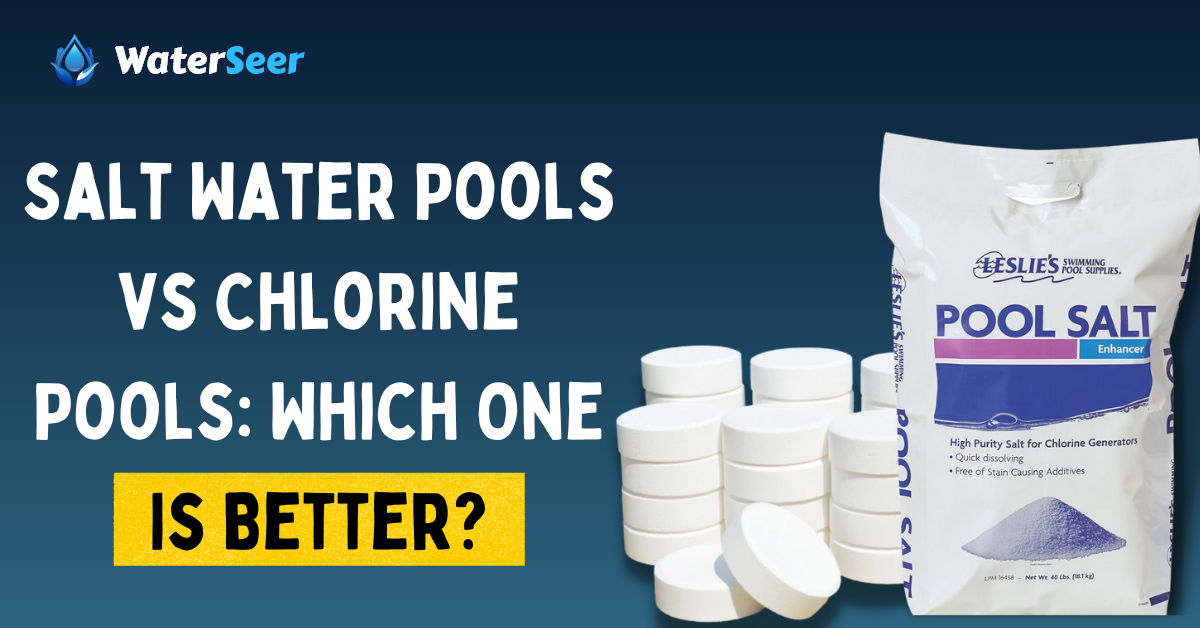Ahh, there’s nothing quite like having a sparkling, clear pool in your backyard to just make you feel like you have your own little slice of paradise at home. Plunging into the crisp, cool water is a marvelous way to feel refreshed and to get away from the reality of a hot, sweaty summer day.
Everyone has their own swimming preferences. And luckily, when it comes to your home pool or backyard pool, there are many options available. From depth to shape to size and more, everything can be tailor-fit to your liking — and this includes your water sanitation method.
Two popular and commonly used systems for backyard pool maintenance are the saltwater system and the traditional chlorine system. In order to help you decide which of these two systems is best for you, we’ve come up with a detailed comparison. So, salt water pools vs chlorine pools: Which is better? Let’s find out!
Salt Water Pool vs Chlorine Pools: Which Is Which?
When people think of swimming pools, chlorinated pools are often the first thing that comes to mind. However, salt water pools are beginning to rise in popularity because of their lower maintenance needs and their gentler effects on the hair and skin.
What is a Salt Water Pool?

Perhaps the biggest misconception or myth about saltwater pools is that they have zero chlorine content because the water in them is sourced from the sea. But this is very much not the case.
Saltwater pools are often mistaken for seawater pools, but salt water does not equal sea water when we are talking about pools. While yes, the water in salt water pools is indeed salty, that water is not actually from the ocean.
Saltwater pools are made up of regular pool water that has salt added in. Salt is important for pools because its chemical structure has chlorine. This chlorine can be used to aid in keeping your pool clean as well as free from certain perks microbes.
To make low levels of natural chlorine, salt water pool systems utilize electrolysis. A generator then converts the salt to low amounts of chlorine and adds enough of it to maintain the cleanliness of the water without the use of excess chemicals. With a good saltwater pool system, you will need to check the levels of the salt in the pool just once per month.
Since an electrolysis generator is used in salt water pool systems, they often have a higher upfront cost.
What is A Chlorine Pool?

Chlorine pools are generally the more “traditional” option among these two. They are very popular because they are less costly to install and much easier to maintain. Unlike salt water pool systems, in chlorine pool systems the chlorine is added and not naturally produced.
In chlorine pools, a chemical system is utilized to balance out the chlorine that is in the water in the pool. With the use of chlorine tablets, liquids, or sticks, the amount of chlorine is balanced out in order to avoid potentially hazardous results. This will need to be done on a weekly basis — and also most likely whenever it rains.
With chlorine pools, you have to be mindful of the fact that chlorine gives off a significant amount of dangerous fumes, so you have to keep chlorine in a storage area that is well-ventilated. Typically, that means storing it in a place like a shed that’s outside of the house itself.
Also Read: 8 Best Whole House Water Filter System Reviews for 2022
The Pros And Cons Of Both Pool Systems
Both pool water systems have pros and cons, so let’s check in on them and see what each one is all about.
Salt Water Pools
Salt water pools may not be as traditionally used, but they are gaining a lot of traction. Learn more about this pool water system.
- Lower chlorine levels in saltwater pools make them much more gentle on the skin and the eyes. This makes it a wonderful choice, especially if the pool will be used by children as well as by athletes who will be immersed in the water for long periods of time.
- The chlorine levels found in salt water pools are enough for the chlorine to act as a very effective disinfectant at the same time, not enough to cause damage and fade to expensive swimwear and gear.
- Since chlorine is natural, saltwater pools need fewer chemicals and less attention when compared to pools that are chlorinated.
- A saltwater pool is a lot more costly than a traditional pool. This is because a saltwater pool requires a higher amount when it comes to the initial investment.
- In comparison to chlorinated pools, there is more complexity in a saltwater pool system. Repairs, both major and minor ones, will need the attention and expertise of a licensed and specialized technician.
- Saltwater can be damaging. Because of this fact, you will have to buy underwater lighting, fixtures, liners, heaters, and masonry work that is specific to saltwater pools. This will also lead to more expensive costs as you do pool renovations.
Chlorine Pools
Chlorine pools are more common and more traditional because of the ease and accessibility when it comes to installation and maintenance.
- The initial investment for chlorine pools is much, much less than that for saltwater pools.
- Chlorine pools use significantly less electricity. Saltwater pools need a specific salt chlorine generator that will convert the salt into chlorine. On the other hand, chlorine pools just need a pump that will circulate the pool water, which prevents bacteria, algae, and dirt from multiplying in it, as well as cleaning equipment.
- Chlorine is a fixture-friendly chemical.
- Most repairs for chlorinated pools can be done in DIY or do-it-yourself fashion. If that can’t be done, finding someone who will be able to fix the problems in your chlorine pool systems will not be a problem at all.
- Chlorine is a chemical that is known to be quite harsh on the eyes, skin, and hair. Chlorine can also be harmful to the paint of your pool deck if you do not choose the right paint. Swimmers have to invest in bath products that will remove chlorine effectively.
- Chlorine pools need constant vigilance so that excess bacteria will be terminated. This means that you will need to check in on the chlorine content regularly. Additionally, other chemicals like balancing agents have to be added inconsistently. The bottom line is that you have to make sure you’ve got the budget to regularly maintain a chlorinated pool, and you also need to check on the chemical composition of your pool habitually.
- Chlorine needs to be properly stored. A separate, exclusive area may need to be dedicated to storing, and this area has to be moisture-free too.
Comparison Between Salt Water Pool vs Chlorine Pools
Now that we’ve seen the pros and cons of each pool system, let’s discuss some points that you may want to consider as you choose the best option for you.
1. Salt Levels And Chlorine
As we mentioned above, a common misconception is that salt water pool systems do not contain chlorine. In reality, saltwater systems are currently most favored over chlorine systems. A saltwater pool will contain lower chlorine levels than a traditional chlorinated pool since the chlorine is made at a steady level and not added to the pool water with chlorine tablets and sticks.
Despite its name, the salt content in a saltwater pool is approximately just that of human tears! This is about one-tenth of the salinity of seawater. Swimmers will be able to open their eyes while underwater — and the skin feels softer after swimming.
2. Health Concerns
A saltwater pool has a lower chlorine concentration. This makes it gentler on the skin, which is a big benefit to swimmers who have allergies and will lead to smoother skin for everyone in general. This lower concentration also means less fading for swimwear and gear. Chlorinated pools have a higher concentration of chlorine and can lead to itchy, dry, and burning skin.
Another health benefit is that the storage of salt for saltwater pools needs no special considerations, unlike chlorine which has to be stored in a particular manner to make sure it is not hazardous to homeowners who may breathe the fumes — and chlorine also needs special care in storage in order to maintain its effectiveness.
3. Costs
The biggest disadvantage of a saltwater pool system is that the upfront cost is significantly higher than that of a chlorinated pool. The saltwater generator, in particular, is very expensive. The initial investment will be much more costly than that of a chlorinated pool.
However, when it comes to the costs of yearly maintenance, a properly maintained salt water pool will require less money yearly compared to chlorine pools which are more costly with regards to maintaining.
Another factor to consider is that more electricity is needed for saltwater pools, which means another added cost.
4. Maintenance
The biggest benefit of a saltwater system for its owners is the low maintenance required by this type of pool. A traditional chlorine pool needs more regular maintenance — weekly, in fact.
But if problems in the systems arise, it will be more complex to address that of a saltwater pool than that of a chlorinated one.
You May Like to Know: 5 Best Countertop Water Filter System: 2022 Reviews + Buyer’s Guide
Conclusion
Both salt water and chlorine pools are effective when it comes to sanitation and provide you with a clean, clear pool to enjoy. As to which one is better, well, it depends on the considerations. When it comes to costs, chlorine pools may be better. When it comes to health, salt water pools are the preferred choice.
| Check Out These Article |
|---|
| Seltzer vs Sparkling Water |
| Club Soda vs Sparkling Water |
| Soda Water vs. Club Soda |
| Soft Water vs. Hard Water |
| Spring Water vs. Purified Water |
| Distilled Water VS Purified Water |

